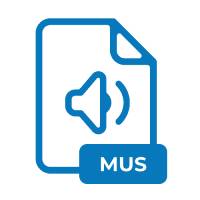.MUS File Extension

Finale Notation File (Legacy)
| Developer | MakeMusic |
| Popularity | |
| Category | Audio Files |
| Format | .MUS |
| Cross Platform | Update Soon |
What is an MUS file?
The .MUS file extension is associated with Finale, a renowned music notation software widely used for composing, arranging, and engraving music. These files contain musical scores created and saved within the Finale program.
The .MUS format is integral to preserving the intricate details of musical compositions, allowing users to share, edit, and print their work seamlessly.
More Information.
The .MUS file format was introduced to provide a standardized way of saving musical compositions within Finale. It encapsulates not only the musical notes but also intricate details such as tempo, dynamics, articulations, and more.
This format serves as a comprehensive container for the entirety of a musical score, ensuring fidelity to the creator’s original intent.
Origin Of This File.
The .MUS file extension is specifically tailored to Finale, a product developed by MakeMusic. Finale has been a staple in the music notation software industry, empowering composers, arrangers, and musicians to bring their musical visions to life since its inception.
File Structure Technical Specification.
.MUS files are encoded in a proprietary binary format, optimized for efficient storage and quick retrieval of complex musical data.
The structure includes sections dedicated to storing information about instruments, notation elements, layout, and other critical aspects of the musical composition.
The technical specifications are designed to maintain the integrity and accuracy of musical notation.
How to Convert the File?
Windows:
- Open Finale on your Windows computer.
- Load the .MUS file you want to convert by selecting “File” and then “Open” within Finale.
- Once the file is open, navigate to the “File” menu again and choose “Export.”
- Select the desired output format for conversion, such as MIDI or PDF.
- Follow the on-screen prompts to complete the export process.
Linux:
- Install Finale on your Linux system using compatibility tools like Wine or PlayOnLinux.
- Launch Finale and open the .MUS file from the “File” menu.
- Navigate to “File” again and choose “Export.”
- Choose the desired format for conversion, such as MIDI or PDF.
- Follow the on-screen instructions to complete the export process.
Mac:
- Open Finale on your Mac system.
- Load the .MUS file by selecting “File” and then “Open” within Finale.
- From the “File” menu, choose “Export.”
- Select the format you wish to convert to, such as MIDI or PDF.
- Complete the export process by following the on-screen prompts.
Android:
- Upload the .MUS file to an online conversion tool that supports music notation formats.
- Choose the output format for conversion, such as MIDI.
- Follow the website’s instructions to convert the file.
- Download the converted file to your Android device.
iOS:
- Ensure you have a music notation app or Finale installed on your iOS device.
- Open the app and import the .MUS file using the app’s file management system.
- Once the file is loaded, look for an option to export or convert the file within the app.
- Choose the desired format, such as MIDI or PDF.
- Follow the on-screen instructions to complete the conversion process.
Advantages And Disadvantages.
Advantages:
- Comprehensive Representation: .MUS files encapsulate a wide range of musical details.
- Interoperability: Finale’s popularity ensures that .MUS files can be shared and opened by users across different platforms.
Disadvantages:
- Proprietary Format: The binary nature of the .MUS format can pose challenges for third-party applications.
- Software Dependency: .MUS files can only be fully accessed and edited within Finale.
How to Open MUS?
Open In Windows
To open a .MUS file in Windows, ensure that Finale is installed on your system. Simply double-click on the file, and it should automatically open within the Finale application. Alternatively, you can launch Finale and use the “Open” option to browse and select the desired .MUS file.
Open In Linux
While Finale is not native to Linux, users can explore compatibility options such as Wine or PlayOnLinux to run Finale. Once installed, follow the same steps as on Windows to open .MUS files.
Open In MAC
On Mac, opening .MUS files is straightforward. If Finale is installed, double-clicking the file should launch it in the Finale application. Alternatively, open Finale and use the “Open” option to select the desired .MUS file.
Open In Android
While Finale is not available as a native Android app, users can explore file conversion options or use third-party applications that support .MUS files.
Open In IOS
On iOS devices, ensure that Finale or a compatible music notation app is installed. Access the .MUS file through the app’s file management system or open it directly from the email or cloud storage.
Open in Others
For other platforms, the key is to have access to Finale or a compatible music notation software. Follow similar steps as outlined for Windows, Linux, Mac, Android, or iOS, adapting them to the specific operating system requirements.










